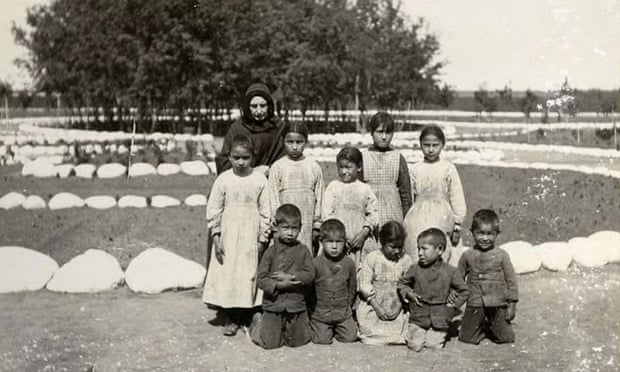Statues of Queen Victoria and Queen Elizabeth II have been toppled in Canada amid growing outrage over the discovery of unmarked graves belonging to Indigenous children.
A group gathered at the Manitoba legislature in Winnipeg pulled down the statue of Victoria on Canada Day – an annual celebration on 1 July that marks the country’s confederation.
Members of the group, wearing orange shirts to honour Indigenous children sent to the country’s notorious residential schools, covered the statue and its plinth in red handprints and left a sign that read “We were children once. Bring them home.”
A smaller statue of Elizabeth was also toppled on the east side of the grounds. Both royals are seen as representative of the country’s colonial history.
Demonstrators toppled statues of Queen Victoria and Queen Elizabeth in Winnipeg this afternoon during rallies honouring the children discovered in unmarked graves on the sites of former residential schools over the past month. pic.twitter.com/Zx0aqPGcOW
— APTN News (@APTNNews) July 2, 2021
At least 150,000 Indigenous children were taken from their families to attend the schools over a century as part of the campaign by the government to forcefully assimilate the children into Canadian society.
Quick GuideCanada's residential schools
Show

Canada's residential schools
Over the course of 100 years, more than 150,000 Indigenous children were taken from their families to attend state-funded Christian boarding schools in an effort to forcibly assimilate them into Canadian society.
They were given new names, forcibly converted to Christianity and prohibited from speaking their native languages. Thousands died of disease, neglect and suicide; many were never returned to their families.
The last residential school closed in 1996.
Nearly three-quarters of the 130 residential schools were run by Roman Catholic missionary congregations, with others operated by the Presbyterians, Anglicans and the United Church of Canada, which is today the largest Protestant denomination in the country.
In 2015, a historic Truth and Reconciliation Commission concluded that the residential school system amounted to a policy of cultural genocide.
Survivor testimony made it clear that sexual, emotional and physical abuse were rife at the schools. And the trauma suffered by students was often passed down to younger generations – a reality magnified by systemic inequities that persist across the country.
Dozens of First Nations do not have access to drinking water, and racism against Indigenous people is rampant within the healthcare system. Indigenous people are overrepresented in federal prisons and Indigenous women are killed at a rate far higher than other groups.
The commissioners identified 20 unmarked gravesites at former residential schools, but they also warned that more unidentified gravesites were yet to be found across the country.
On Thursday, the Lower Kootenay Band announced they had discovered 182 human remains in unmarked graves at a former residential school— the latest in a series of grim discoveries that have shocked the country.
The recent discoveries had previously led to calls from Indigenous groups to not celebrate Canada Day.
“We will not celebrate stolen Indigenous land and stolen indigenous lives. Instead we will gather to honour all of the lives lost to the Canadian state,” said the group Idle No More, calling for national rallies to support Indigenous communities.

In Ottawa, thousands gathered on Parliament Hill for the “Cancel Canada Day” rally, shouting “Shame on Canada” and “Bring them home”.
Prime minister Justin Trudeau acknowledged the sombre tone of the federal holiday has taken on this year, an event typically marked with fireworks, picnics and downtown parties.
“The horrific findings of the remains of hundreds of children at the sites of former residential schools in British Columbia and Saskatchewan have rightly pressed us to reflect on our country’s historic failures, and the injustices that still exist for Indigenous peoples and many others in Canada,” he said in a statement. “We as Canadians must be honest with ourselves about our past.”
On Thursday, Calgary police announced that 10 churches in the city had been vandalized overnight with orange and red paint. One just had a window smashed so paint could be thrown inside. Police say painted handprints and “215”— a reference to the first discovery of unmarked graves by the Tk’emlúps te Secwe̓pem in late May—suggested the vandalism was linked to outrage over the unmarked graves.
Protestors have increasingly targeted historical figures that were complicit in the establishment and operation of the schools, which lasted more than a century.
Last month, protesters also pulled down the statue of Egerton Ryerson in Toronto. A prominent figure, Ryerson is widely seen as an architect of the country’s residential school system.
In the UK, a Downing Street spokesperson said: “We condemn any defacing of statues of the Queen. Our thoughts are with Canada’s indigenous communities following these tragic discoveries.”